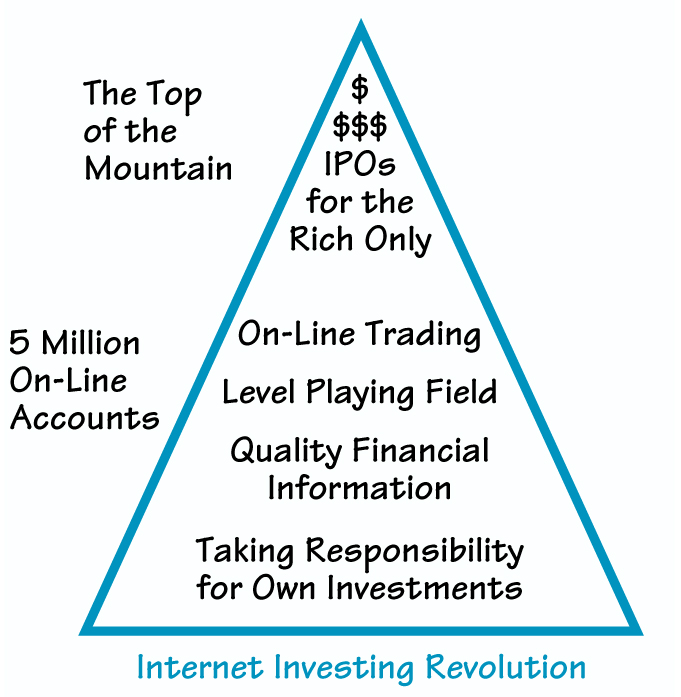The Internet Revolution
In the past, Initial Purchase Offerings (IPOs) and other lucrative investments in up-and-coming companies were available only to large institutions, to those few who had big money to risk, or to top corporate officers. In the diagram below, these firms and individuals are grouped at the top—the realm of the rich.
Now, individuals with more modest holdings can take advantage of the information available online to take part in the explosion of IPOs (the bottom of the diagram). Over 5 million people have opened online investment accounts. And many workers at Internet start-ups have been offered stock options as part of their compensation packages. From this perspective, the Internet has leveled the playing field and offered many individuals the possibility of large financial gains.

Your perception of this Internet investment revolution depends on your perspective. If you have been one of the few who have long dominated the top of the “mountain,” you might see this change as an assault on your position. If, however, you are an online account holder or a worker who has accrued stock options, you probably view this shift in the market as an amazing opportunity.
Thus, is the conclusion valid that “flipping” debases the concept of meaningful work by focusing people’s attention exclusively on money? Or is it possible that we may need to redefine what meaningful work entails? Tim Gallwey refers to the “Work Triangle”—performance, learning, and enjoyment—in The Inner Game of Work (Random House, 2000). Working for—or investing in—Internet companies may offer people opportunities for learning and enjoyment that they might otherwise miss in the push for performance.
—Pat Zito
Note: A version of this diagram was originally used in Trade IPOs Online by Matthew D. Zito and Matt Olejarczyk (John Wiley & Sons, 2000).
Community Wealth and Well-Being
(For the causal loop diagram and full text of this write-up, go to http://www.pegasuscom.com/massey.html.) We viewed this case as an example of the “Shifting the Burden” systems archetype. The growing number of people choosing to build organizations to flip is indicative of the level of economic vulnerability felt by individuals in a community. Flipping is a symptomatic response to this vulnerability. A more fundamental solution would be to address the level of community wealth and well-being by creating “Built to Last” (BTL) organizations, which involves significant delays.
The flipping activity sets off a number of reinforcing loops that make the situation more difficult for those who would like to see increasing community wealth and wellbeing as the basis for individual wealth and well-being. First, flipping can lead to a growth in destructive individualism that directly undermines community well-being. Flipping also creates business opportunities for others in the community (brokers, venture capitalists, and so on), leading to a growing infrastructure to support flipping. This infrastructure shifts investment away from BTL organizations, leading to fewer new BTL efforts and more BTL failures.
FEEDBACK LOOP
—Massey University’s Organizational Learning Class of 2000
